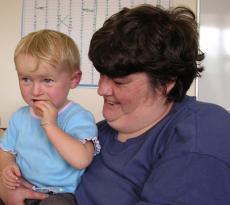Sexual Development
Sexual development in PWS is affected by the diminished or disrupted production of sex hormones. This condition is called hypogonadism (failure of the gonads to function properly – testes in men and ovaries in women.) In PWS, hypogonadism is present from birth and is thought to be caused by a combination of hypothalamic and primary gonadal deficiencies.
Hypogonadism in PWS is characterised by underdeveloped genitalia, incomplete puberty and infertility. The affects on genitalia are evident from birth, in both boys and girls. Cryptorchidism (undescended testes) is typical in the vast majority of male infants and a procedure called orchidopexy may be necessary to bring the testes down if they do not descend naturally or with other treatment. This procedure should take place before 2 yrs to prevent increased risk of malignancy.
Puberty and Fertility
Puberty is usually delayed and/or incomplete, with slow or disrupted progression. However, on average, children with PWS reach a stage called pubarche (development of pubic hair) earlier than is typical, but premature pubarche (usually caused by premature adrenarche) can happen as early as before the ages of 8 or 9 in 14-30% of children with PWS. This is not related to actual pubertal onset. Adrenarche is a separate process to puberty which typically occurs a few years before and causes new hair growth, body odour, skin and mood changes.
The onset of actual puberty may begin as expected or be delayed. Early pubertal development is often experienced normally with some breast development in girls and a degree of penile development in boys. However, the penis and testes rarely reach full development and menstruation in girls either does not start, is sporadic, or is very delayed, sometimes starting much later in adulthood. Some girls develop oligomenorrhea (infrequent menstrual periods) which is usually only intermittent spotting, but primary amenorrhea (absent menstruation) is slightly more common. A very small number of children with PWS are affected by precocious (early) puberty which can result in having a slightly advanced bone age. Treatment to suppress development may not be needed as pubertal advancement is usually not sustained.
Fertility
It was previously thought not possible for men or women with PWS to have children. There are no known cases of a man with PWS fathering a child, but there have been a handful of women with PWS who have had a baby. Fertility is unlikely, but current advice is that birth control should be considered for women with PWS who are sexually developed, even if menstruation is sparse and minimal. Serial measurements of inhibin B levels can test for potential fertility. Similarly, males should also be counselled about the possibility of their own fertility if penile length and testicular volume is normal. Infertility in males is complex and it remains unknown if it is possible to correct. Multiple forms of hypogonadism have been observed involving testicular dysfunction and various hormone deficiencies. If fertile, individuals with PWS by deletion have a 50% chance of their baby being born with either Angelman syndrome if they are female, or PWS if they are male. Those with PWS by UPD would have every chance of having a healthy baby.
Sex Hormone Treatment
Testosterone therapy for boys and oestrogen therapy for girls can be used for promoting and maintaining pubertal development. They are sometimes prescribed to induce puberty, but are often used when puberty stalls. Whilst it is thought to be unlikely or not possible that these therapies have the potential to bring about fertility, they can increase satisfaction with body image and may improve sexual function. However, research suggests that attempts to normalise male genitalia with gonadtropins and androgens might be more effective during infancy or early childhood. (HCG injections currently appear to be unavailable in NZ.)
Sex hormone therapies are also beneficial for bone health, retaining muscle mass and for general well being. Due to hormone deficiencies, adults with PWS have low bone mineral density, but sex hormone therapy can increase bone density and help prevent osteoporosis, particularly if given during the period of bone building (before age 25-30 yrs.) Sex hormone therapy is recommended beyond puberty and through adulthood.
Treatment requires careful monitoring and with additional care during the growth period not to compromise height. There is no expert consensus on the optimal time to start sex hormone therapy, except that it should start at low dose with gradual increases. Speaking at the 2018 Asia-Pacific PWS Conference, Prof Gary Wittert recommended judiciously starting testosterone treatment as early as 14.5yrs. He suggests testosterone combined with GH can optimise muscular skeletal development, but careful management is required to ensure bone age is not advanced in excess. Currently, a typical starting age for testosterone seems to be around 15-16 years and treatment is not recommended before 14 years to avoid early epiphyseal closure causing abnormally short height. Oestrogen is recommended if there is no breast development by age 13 or no menstruation by age 16. A standard approach for girls is to prescribe oral oestrogens for around 2 years and then to add in progestogen. Prof Gary Wittert recommends switching from oestrogen to a combined oral contraceptive once the first menstrual period occurs. At the 2015 Asia-Pacific Conference, Assoc Prof T Markovic raises the question whether topical (transdermal) oestrogens would be a better option than oral oestrogens due to the higher potency of oral oestrogen which can increase GH binding and lower IGF-1 levels, as shown in this study. In NZ, testosterone can be administered via oral tablets, transdermal patches or intra-muscular injections (gels available overseas.) Assoc Prof T Markovic reports that practice at their Sydney clinic is to start with a weak oral treatment called Andriol and then slowly build the dose. Once treatment is established they move patients onto adult treatment with IM injection. Monthly IM injections do not allow for stopping treatment quickly if behavioural problems occur so families may wish to consider alternatives. Peaks and troughs of hormone levels can cause some individuals to experience mood highs and lows which may be reduced by weekly or 2 weekly injections at lower dose, or by using patches or oral tablets to reduce mood instability. Some patches are only worn overnight which reduces risk of rash and picking.

Key Points for Providing Support
- Puberty is usually delayed and incomplete. The person with PWS will be aware of their developmental differences and this needs to be handled sensitively.
- Sex hormone treatments should be considered to help normalise pubertal development and improve sexual function.
- Inidividuals with PWS have the same needs and desires as everyone else and want to have relationships.
- Sex education needs to explicitly teach responsibilities, boundaries, appropriateness and safety because it cannot be assumed these are understood.
- Long term relationships can be successful with appropriate support.
- Fertility is unlikely, but female fertility is possible, particularly if inhibin B levels are within normal range. Male fertility is very unlikely, but fertility outcome with sex hormone treatment is uncertain without testing. Birth control should be considered.

Relationships
Individuals with PWS appear to have a normal sex drive and want to have relationships in the same way as their peers. They will dream of having a partner, getting married and having a baby, so it is advisable to help them understand and accept the limitations of sexual development in PWS ahead of time so that it is not a shock and cause of stress later on.
The social and emotional deficits of PWS can lead to a somewhat naive approach to relationships. Individuals with PWS are often very open about their wants and desires, can form stereotyped ideas and may lack understanding of relationship appropriateness. It is important that sex education for people with PWS includes clear information about responsibilities, limits and boundaries, what is OK behaviour, and saying no. People who have intellectual disabilities are also known to be more vulnerable to sexual abuse and therefore need ongoing, additional guidance on keeping themselves safe.
Relationships can be difficult to sustain due to social skill and behavioural challenges, but long lasting relationships can be achieved with sufficient support. For example, support may be required in facilitating problem solving due to difficulties in understanding the feelings of others and expressing their own. Relationships can be successful and some people with PWS have been known to become engaged and marry.
Additional Resources
- Growing Up Animations – VIDEOS: Sex education specifically for young people and adults with PWS, by the PWSA(UK)
- Social Life and Relationships: 18 – 25 years – by the PWSA(UK)
- Social Life and Relationships: 25 – 40 years – by the PWSA(UK)
- Some examples of resources which are available to borrow from the IHC Library: Talking together…about sex and relationships – a practical resource for schools and parents working with young people with learning disabilities; Jason’s Private World – DVD 2012; Love and kisses / relationships & sexuality featuring people with disabilities – DVD 2006. A positive look at the intimate lives of people with disabilities through drama and interviews looking at dating, building relationships, safe sex, unwanted touching and rights, marriage; Your rights about sex – a booklet for people with learning difficulties; Picture Yourself – a teaching resource; Feeling sexy, feeling safe – a booklet and DVD 2002. Public and private parts of the body, public and private places, saying yes and no to sex, and the sexual person.
- Healthy Relationships Programme – for teens and adults with intellectual disabilities. Provides practical tools to build resiliency and to prevent bullying, violence and abuse. By Kidpower Teenpower Fullpower Trust NZ (www.kidpower.org.nz)
- Sexuality and PWS – VIDEO: B J Goff presenting at the 4th Asia-Pacific Conference, 2018
- Puberty Hormones – by Kathy Clark, R.N., M.S.N., B.C.- C.S., PWSA(USA) Medical Affairs Coordinator (2018). Reviewed by Susan Myers, M.D., PWSA(USA) Clinical Advisory Board.
- Hypogonadism in PWS – VIDEO: Assoc Prof T Markovic presenting at the 3rd Asia-Pacific PWS Conference, 2015
- PWS and Endocrine Function – VIDEO: Prof Gary Wittert presenting at the 4th Asia-Pacific PWS Conference, 2018
